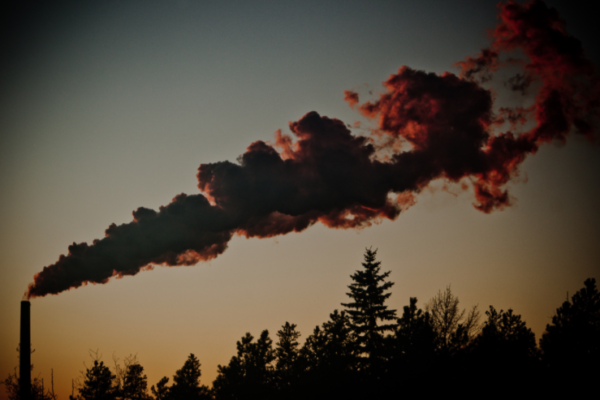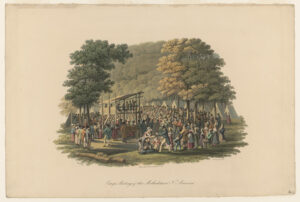This is a panelist contribution for our upcoming webinar, “How Can Christian Socialists Build Deeper Solidarities?” co-hosted by the Institute for Christian Socialism and the Wendland-Cook Program for Religion and Justice. Register for the webinar here, which takes place on Monday, April 12 at 7:00 pm CST.
___
ONE translation of the famous socialist cry for labor solidarity against capitalist oppression reads: “Workers of all lands, unite!” This evocative rendition invites us to expand our understanding of worker agency to include the lands, waters, skies, plants, and animals in the sustainment of the world. In truth, not only is the exploitation of human workers a central feature of capitalism, so too are the labors of the whole of non-human creation (Rom. 8:19-23) diminished and degraded – to the point of exhaustion, precarity, and ultimately collapse – within an economic system powered by the unrelenting drive for private financial gain. We might even say that more-than-human Nature is now rising up in protest to throw off the chains of bondage. From my perspective, as a Christian and an eco-socialist, the intersectional analyses and collective actions urgently needed today are those that will contribute to the deepening of both social and ecological solidarities.
Human life is wholly reliant on the web of biotic and abiotic relations that make up our planetary home. Without the contributions of soil microorganisms and minerals, richly diverse and interwoven plant, animal, and insect populations, solar heat, rivers, lakes, and ocean waters, and stable earth systems that regulate temperature, humidity, and far more, we human creatures simply would not exist. In the first creation story (Gen. 1), humankind is formed last, and in the second story (Gen. 2), directly from the earth, suggesting both a terrestrial unity of all created life and a mutuality of inter-dependencies, with human existence in fact the most dependent. Whatever uniqueness we might possess among the other creatures, interpretations of humanity’s vocation to “have dominion” (1:28) over them that serve to justify or sanction the “biological annihilation” of species are – to understate the matter – theologically blasphemous, spiritually wicked, and scientifically ignorant.
The growing number of environmental appeals, initiatives, and organizing efforts that are now emerging from diverse Christian traditions worldwide is a cause for encouragement. But far too many Christians who are genuinely committed to the just care of creation remain unwilling to recognize that capitalism is the root cause of the rotten ecological fruits (Matt. 7:16-20) they rightly lament. And here is where critical analysis is crucial in helping us to see at the level of deep patterns, material forces, and systemic connections.
Socialist analysis, in particular, provides a necessary lens through which to understand that in a capitalist society, the value of work is determined only after any particular labor is transformed into a commodity, or something that can be bought and sold through market exchange. And because the sole purpose of capitalist production is to maximize short-term financial returns on a trajectory of perpetual growth, the large majority of those who own the means of production, including shareholders and investors, will always seek to extract as much value as possible from labor and society in order to stay competitive, while simultaneously seeking ways to minimize compensation. This basic pattern holds true, regardless of how personally kind-hearted, devout, socially well-intentioned, or charitable individual members of the ownership class might be. The strategies are legion, but we can name depressed wages, unpaid domestic work, layoffs/unemployment, management for hyper-productivity, shifting work patterns, benefits, and locations in a global race to the bottom, and corporate tax avoidance, as well the propagation of white supremacist chauvinism.
From an eco-socialist perspective, we can recognize comparable patterns and strategies at play in capitalism’s extractive and degenerative impact on more-than-human Nature. Like the domestic work of childcare and home-keeping, the life-sustaining labors of earth’s creatures and systems – often feminized – go unaccounted for within capitalist economies, allowing producers to extract financial value from what are deemed “natural resources” without any proper compensatory return. The inevitable result, especially when coupled with over-management for the sake of increasing productivity, is the ongoing depletion of myriad life forms and ecosystems at rates faster than they can be replenished. Examples include the overfishing of oceans, deforestation, soil degradation, and the overgrazing of lands. And just as private enterprises are able to externalize the costs and consequences of low wages and benefits for workers onto society, they similarly externalize the environmental wastes of production and distribution into the biosphere.
The root cause of single-use plastics, landfill overflows, and most notably climate change, is not the consumption habits of individuals – although if we’re to focus here, the chief culprits are undoubtedly the world’s super-rich – but rather the capitalist system that organizes and governs social and ecological relations worldwide. Neither conscientious consumption nor the “greening” of products and services will save us from the “ghastly future” that is already now breaking into the present. To be blunt, the only Christian appeals for creation care that ought to be taken seriously will be those that are explicitly anti-capitalist (Matt. 3:10).
As Marx clearly saw, the exploitation of humans and more-than-human Nature in capitalist economies have always been intimately interconnected. As such, it is not by chance that the cries of the oppressed and the cries of the earth are so often entwined at common sites of socio-ecological degradation. From the beginning, capitalism’s integral accomplices of race and racism, settler colonial conquest, hetero-patriarchal domination, and related forms of social oppression have intersected with innumerable forms of violence against the lands, air, waters, plants, and creatures, all for the sake of maximizing short-term capital gains.
The fact that a growing number of Christians are “connecting the dots” here in recognizing that those currently suffering the worst effects of climate change are the world’s poor, whose skin colors are darker hued, including indigenous peoples, women, children, and the elderly, is crucially important. But understanding the broader picture – which is what the most steadfast form of a neighbor-love-that-seeks-justice presses us toward – also requires seeing that the intersecting lines materialize in and through the logics and operations of capitalism.
The struggle against exploitative domination and for equitable, mutualistic social relations is perhaps the central concern of the Hebrew and Christian scriptures. From the exodus of those forced to labor under cruel working conditions (Ex. 1:11-14) to the prophetic denunciations of the wealthy who hoard their spoils stolen from the poor (Is. 3:14-15) to Mary’s song of praise that the powerful are brought down and lowly lifted up (Luke 1:46-55) to Jesus’ upending tables of economic exploitation (Matt. 21:12-16), the persistent theological claim is that the divine source of all life hears the cries of the oppressed and takes up their side against the pharaohs, taskmasters, moneychangers, and lords of history.
Throughout these narratives, more-than-human Nature plays a central role as both co-agent and habitation of salvation. The floods, hail, animals, amphibians, insects and pillars of fire and cloud co-labor with the Hebrew workers for redemption toward the promise of lands overflowing with the fruits of abundance. And amidst repeated perversions of justice, the prophets envision a new society in which ecological flourishing is rooted in social equity and peace (Amos 9:11-15). Jesus, who is befriended in the wilderness by animals (Mark 1:13) and who cooperates with the elements in his healing ministry (John 9:1-12), most often describes the breaking in of God’s reign of loving-justice through the operations of seeds, soil, bushes, birds, stone, pearl, grains, fish, and branches. And for Paul, the gospel is the good news of God’s “new creation” in Jesus (2 Cor. 5:16), the “first fruits” (1 Cor. 15:20) and “firstborn of all creation” (Col. 1:15), through whom we are invited to be reconciled within a new social formation in which every member is activated by the Spirit to work in organic unity for the sake of the common good of all (1 Cor. 12:4-26).
For those of us committed to this socialism of the Gospel, the deep solidarity that is needed, I believe, will be one that unites diverse efforts within our churches and communities for racial justice, gender equity, queer liberation, ecological sustainability, economic justice, and related emancipatory movements in a common pursuit of a new political-economic system beyond capitalism. Even more, as an eco-socialist and a Christian, I urge us to prioritize solidarity building with the lilies of the field, the birds of the air, fruit trees of every kind, great sea creatures and all ocean depths, the atmospheric dome of the sky, and every creeping thing that creeps upon the earth. For in truth, all of these and more have always been united in a great cooperative labor to sustain all that lives, including we human creatures.
In this sense, the models of political economy that are best aligned with the broad scriptural vision of salvation – from worker-owned cooperatives to publicly-owned utilities to the redistribution of wealth and lands to state-run financial institutions to liberative public education to common pool land trusts – will be those that integrate practices of social and economic democracy with a deep democracy of the earth. Among movements on the Left, Christian socialists ought to be the most active today in rejecting industrial, productivist, and techno-utopian capitalisms and socialisms, while organizing instead around the systemic approaches, political principles, reparative policies, and hopeful visions of deep socio-ecological solidarity.
Workers of all lands, unite indeed. The creation is laboring – and not only the creation, but we ourselves are groaning – to be set free!
Timothy Eberhart is Co-Chair of the Institute for Christian Socialism. He is Assistant Professor of Theology & Ecology and Director of the MA in Public Ministry degree at Garrett Seminary in Evanston, IL. He is ordained in the United Methodist Church, a permaculture designer, and an author.




